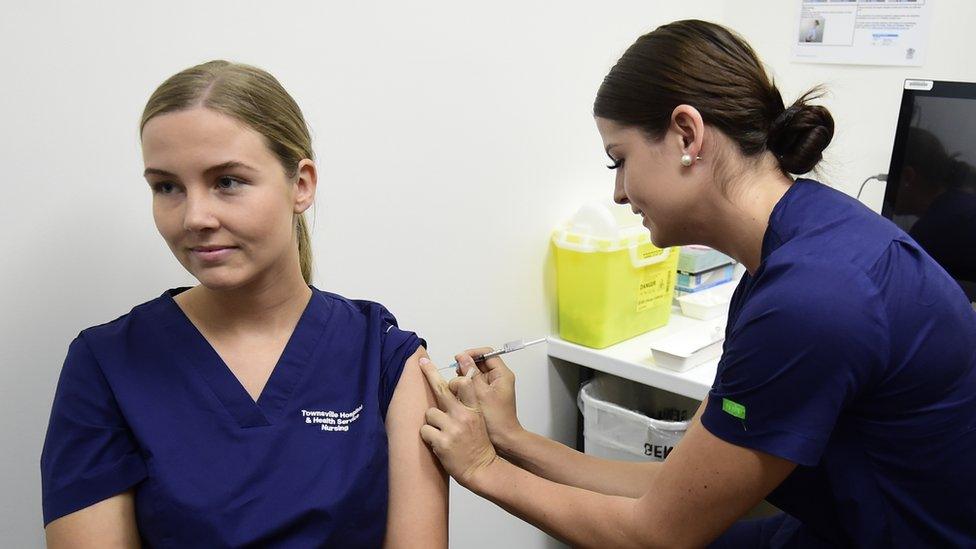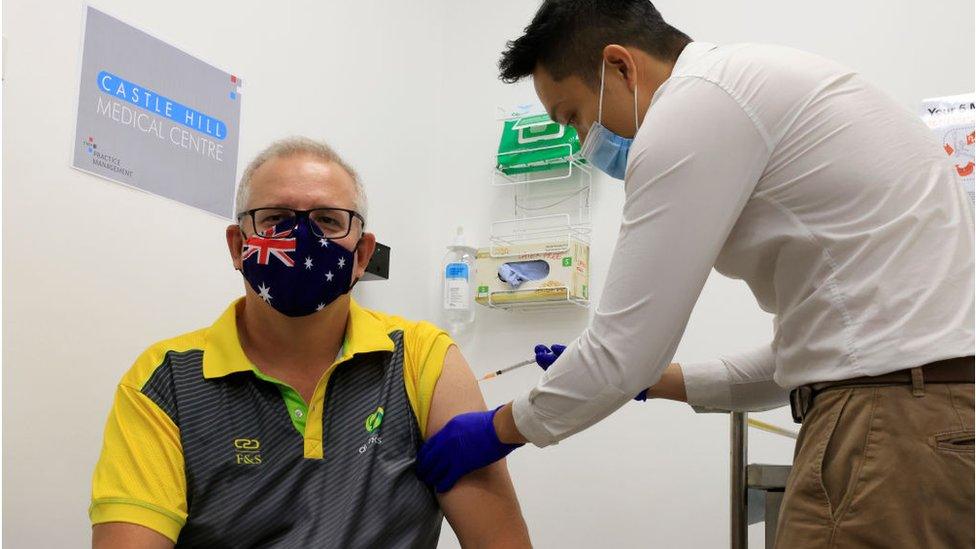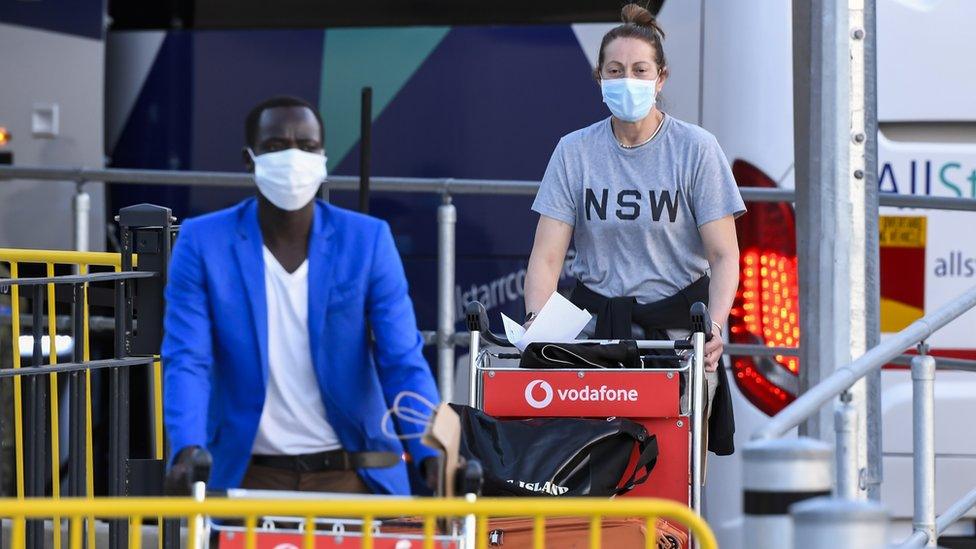Covid: Australia's vaccine hesitancy worries medical experts
- Published

Nurses in Townsville get Covid vaccines
Australia's troubled vaccine rollout has hit a potential new stumbling block - rising vaccine hesitancy.
This week a survey suggested about one-third of Australians said they were unlikely to get vaccinated, reportedly up from previous months.
The caution mostly centres around side effects and a lack of urgency given Australia's low infection rates.
But hesitancy threatens to frustrate plans to open its borders, which are slated to remain shut until mid-2022.
The country of nearly 26 million people has managed to stave off major outbreaks through strict border and quarantine controls, and by periodically enforcing snap lockdowns.
Australia is one of the few places in the world where there is no widespread community transmission of Covid.
But it is also one of the slowest in the developed world to immunise its population.
While the pace of the rollout has picked up in recent weeks - reaching daily records - concern about vaccine hesitancy in some pockets of the community has began to increase.
Why are Australians hesitant?
A combination of fear and complacency over the perceived risk posed by the virus has led to hesitancy among some Australians.
The survey by the Sydney Morning Herald (SMH) newspaper and Resolve Strategic, external found those who had doubts over taking a vaccine were most worried about potential side effects, and did not feel they knew enough about the vaccines.
Australia's rollout was delayed after regulators advised limiting use of the AstraZeneca shot - the country's main vaccine - following cases of rare blood clots linked to the jab.
It now recommends that people aged under 50 get the Pfizer jab instead.
A separate survey released this month by the Australian National University (ANU) also found high levels of concern surrounding side effects.
Tracking about 3,000 participants, the ANU found that while most people would get a safe and effective vaccine, eight in 10 Australians were worried about possible side effects.
Professor Nicholas Biddle said just over 50% of people who said they wouldn't take a vaccine "said their decision was based on recent news about the AstraZeneca vaccine and blood clotting."
Women, non-English speakers and people living outside of cities were most likely to be hesitant, the ANU found.
Australia's isolation is another factor steering some away from a Covid jab.
The SMH survey found 21% of respondents felt a lack of urgency to get immunised while Australia's borders stay shut.
Allow X content?
This article contains content provided by X. We ask for your permission before anything is loaded, as they may be using cookies and other technologies. You may want to read X’s cookie policy, external and privacy policy, external before accepting. To view this content choose ‘accept and continue’.

Overall, the survey found nearly 30% of its respondents were not likely to get the vaccine in the coming months, which the newspaper reported was a stronger level of doubt than seen in polls conducted earlier in the year.
How is the vaccine rollout going?
The rollout has been beset by delays, with initial supply shortages and logistical problems among the factors slowing it down.
More than 3.2 million doses have now been administered, far short of the government's goals.
The country is running a staged rollout which began in March with vulnerable people and elderly Australians. All over 50s are now eligible for a shot.
What has the reaction been?
Doctors want more to be done to encourage people to get vaccinated.
Vice-president of the Australian Medical Association (AMA), Chris Moy, warned Australians are "sitting ducks" until more of the population get immunised.
"Seeing for example what's happening overseas where there's a tsunami of Covid and also the development of variants, that we're sitting ducks as a country and as individuals until we get a significant portion of the population vaccinated," he told the Australian Broadcasting Corp (ABC). , external

Prime Minister Scott Morrison has resisted calls to link a timeline to reopen the borders with vaccine targets
Health Policy Consultant and Adjunct Professor at UNSW Bill Bowtell told radio station 3AW that clearer communication from the government is needed to boost vaccination rates.
"The most important thing we can have as we go forward in this is trust, and trust is only built on the basis of truth," Prof Bowtell said.
"These are all things that ought to be addressed in a much better communications campaign than what we've had from the government."
The AMA has also called for more effective advertising campaigns. The government said it may put more money into information campaigns if needed.
"Advertising plays a role and we're always reviewing that to respond to the needs," Health Minister Greg Hunt said on Wednesday.
"The biggest source of confidence is Australians seeing other Australians have the vaccine.
"That's the single biggest source of confidence that any Australian can have looking at their friends and their family, their mum and their dad, their grandma and their grandpa being vaccinated," Mr Hunt said.
Ros Atkins looks at how a vaccine hailed as a ‘game-changer’ has seen its reputation tarnished
Related topics
- Published1 May 2021

- Published17 June 2021
